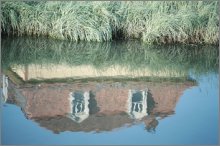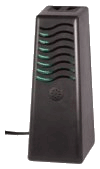Flooding: Are You Aware of This Hidden Risk?
by www.SixWise.com
With the recent heavy rains and storms moving across the country, flooding is a top concern for many homeowners. Earlier this month, New Hampshire, Vermont and Maine reported damaging flooding, as have parts of the Midwest and Colorado.
|

Even tiny creaks, dry streambeds and low-lying ground that looks safe in dry weather can pose a flood hazard if heavy rains fall.
|
Aside from damaging your personal belongings and your home itself, there is another, often overlooked, flood risk that you should be aware of: your home's air.
Air quality is likely the last thing on your mind after a flood has damaged your home, but it should be one of your first.
"Standing water and wet materials are a breeding ground for microorganisms, such as viruses, bacteria, and mold," according to the Environmental Protection Agency (EPA). And once these microorganisms appear, they can infest your indoor air, making it toxic to breathe.
"They [microorganisms] can cause disease, trigger allergic reactions, and continue to damage materials long after the flood," the EPA says.
In fact, if anything in your home has been wet for more than two days, there's a pretty good chance they've become moldy.
How Can Mold Make You Sick?
Mold is a microscopic, living organism whose purpose is to break down dead materials. This is why, over time, it will destroy whatever it is growing on, including your carpets, furniture and cabinets, and even structural elements of your home.
If left untreated, mold will gradually destroy whatever it is growing on -- including structural elements of your home.
However, this is only a part of what makes mold dangerous. Molds release thousands of microscopic spores into the air, and they are easily carried around your home, where you may breathe them in.
It is through this inhalation that mold can cause health problems to you and your family.
"All molds have the potential to cause health effects," says the EPA. "Molds can produce allergens that can trigger allergic reactions or even asthma attacks in people allergic to mold. Others are known to produce potent toxins and/or irritants."
How to Cleanup Flood Waters ... and Restore Safe Indoor Air
Once you've been given the all-clear to return to your home -- and you've contacted your insurance agent to discuss your claim -- your cleanup can begin.
It's essential to begin cleanup as soon as possible, as mold can begin to grow in just 48 hours. Because of this, as you clean you'll be stirring up mold spores and mycotoxins (fungal toxins).
The first thing you should do, before you begin cleanup, is use an Air Treatment System to clean your air, and keep it that way, as you are working. The last thing you need on top of the flood damage is to become sick from breathing in mold spores!
We highly recommend the PIONAIR Air Treatment System for this purpose. Unlike most air purifiers, the PIONAIR™ Air Treatment System doesn't wait for pollutants to contact a filter or plate. Instead, the PIONAIR generates air-purifying technology that migrates through the area and neutralizes organic odors, microbes, and molds at their source.
As a result, the PIONAIR produces fresh clean air throughout your home or office uniformly, by addressing the pollutant source -- without the use of fans, filters, or plates!
|
Fight Mold and Other Airborne Toxins With PIONAIR™ Air Treatment Systems
 Unlike most air purifiers, the PIONAIR™ Air Treatment System doesn't wait for pollutants to contact a filter or plate. Instead, the PIONAIR generates air-purifying technology that migrates through the area and neutralizes organic odors, microbes & molds at their source, replicating the processes nature uses to purify the air outside! Unlike most air purifiers, the PIONAIR™ Air Treatment System doesn't wait for pollutants to contact a filter or plate. Instead, the PIONAIR generates air-purifying technology that migrates through the area and neutralizes organic odors, microbes & molds at their source, replicating the processes nature uses to purify the air outside!
As a result, the PIONAIR produces fresh clean air throughout your home or office uniformly, by addressing the pollutant source--without the use of fans, filters or plates!
Read More About PIONAIR Now!
|
Next, the EPA recommends taking the following precautions when you begin cleanup:
-
Wear an N-95 respirator, which protects against mold. Even though you should be treating your air with an air treatment system, the physical act of cleaning will churn up more mold spores into the air.
-
Wear goggles, to keep contaminants out of your eyes.
-
Wear gloves, so you don't touch the mold.
-
Wear long pants, a long-sleeved shirt and boots or work shoes to further reduce your exposure.
Now it's time to take the following steps to get your home dry and de-contaminated.
-
Get a wet vacuum and several large fans.
-
Vacuum up all the excess water. If deep water is in your basement, you should pump the water out gradually (about one-third of the water per day). If you pump the water from a basement too quickly, pressure from the outside water-saturated soil could cause the walls to collapse.
-
Open up your doors and windows, and place the fans in the openings with the exhaust side facing out, to dry things out as quickly as possible.
-
Clean and disinfect everything that got wet, as floodwater can carry bacteria and chemicals. This includes walls, floors, closets, shelves, furniture and other items. To do this, use an all-purpose, non-toxic cleaner that won't stain, and use it along with PerfectClean Ultramicrofiber Mops and cloths, which will be able to pick up even microscopic contaminants. Any food that has come into contact with floodwaters should be thrown away, as should items that cannot be cleaned thoroughly.
-
Wash your hands often if you come into contact with floodwater.
Finally, if you have extensive damage and need to hire a contractor make sure he or she has experience cleaning up mold. You can also consult the EPA's guide to "Mold Remediation in Schools and Commercial Buildings," which they recommend for homes that have had a lot of water damage or mold growth that covers more than 10 square feet. The report is available for free at www.epa.gov/mold. The EPA recommends asking your contractor to follow the recommendations in their guide.
Finally, you may also need to have your home's heating/ventilation/air conditioning (HVAC) system cleaned. If there is mold near the intake system, or you suspect your HVAC system may be contaminated with mold, do not run the system. Consult with an experienced professional for proper cleaning.
Recommended Reading
Is Your Crawlspace or Attic Making You Sick?
You are Burying Your Face in a Hot Zone for Fungal Spores Every Night: Your Pillow
Sources
U.S. EPA Flood Cleanup